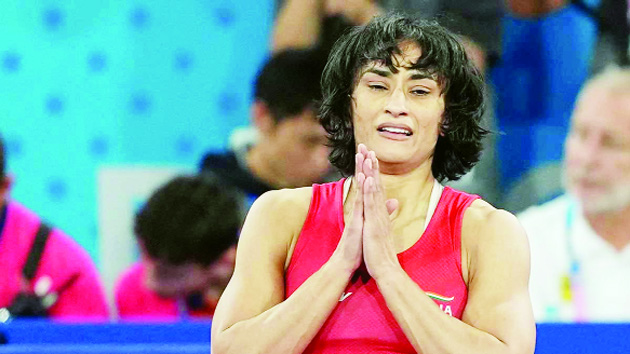K Raveendran
Vinesh Phogat’s Olympics debacle is the ultimate manifestation of the uncertainty in sports, where triumph and tragedy often converge in a moment’s breath. Phogat, a wrestler whose athletic prowess as well as her struggle against sports bureaucracy has made her a beacon of hope and defiance in Indian sports, found her aspirations for gold shattered by a matter of grams-100 to be precise. In a cruel twist of fate, Phogat was disqualified from the Paris Olympics because she exceeded the weight limit for her 50kg-category by just 100 grams. The number 100 turns out to be the most inauspicious for India’s sports aspirations.
The poignancy of Phogat’s situation is accentuated by the historical irony that the head of India’s Olympics establishment is none other than PT Usha, the former track and field star who once narrowly missed an Olympic medal by a mere 1/100th of a second. Usha’s agonizing near-miss in the 1984 Los Angeles Olympics, where she fell just short of a medal in the 400 meters hurdles, epitomizes the razor-thin margins that define the pursuit of Olympic glory. Today, as the Chairperson of the Indian Olympics Association Usha’s tenure will remain marred by Phogat’s disqualification, a setback that not only highlights the bureaucratic failures within the establishment but also underscores the harsh realities of competitive sports.
Vinesh Phogat’s rise has been nothing short of remarkable. Her journey from a small village in Haryana to becoming a prominent figure in the world of wrestling has inspired countless athletes and fans. Phogat has not only demonstrated exceptional skill and determination but has also become a symbol of resistance against the systemic shortcomings and exploitation plaguing Indian sports. Her disqualification at the Paris Olympics is not merely a personal setback but a reflection of the larger dysfunctions within the Indian sports system.
Prime Minister Narendra Modi’s laudatory remarks about Phogat, despite her disqualification, serve as a testament to her stature as an athlete. Modi has described her as a “champion of champions” and a “pride of every Indian,” a sentiment that resonates with the national pride and admiration for Phogat’s achievements and character. However, while such praise underscores Phogat’s resilience and contributions to Indian sports, it also highlights a broader issue of accountability. The political establishment, while quick to celebrate the successes of Indian athletes, must also grapple with its role in the systemic failures that lead to such debacles.
The narrative surrounding Phogat’s disqualification brings to light the underlying issues within the Indian sports system. Despite the government’s public endorsements and the sports establishment’s high-profile appointments, the operational and administrative aspects of sports management often fall short of international standards. Phogat’s disqualification over a weight discrepancy suggests a lapse in the processes designed to ensure fair competition and athlete compliance. It is a stark reminder that the effectiveness of sports administration is not solely dependent on high-profile leaders or public accolades but on the efficiency and accuracy of day-to-day operations.
The role of the sports establishment in Phogat’s misfortune cannot be ignored. As the apex body responsible for overseeing the development and management of athletes, the Sports Authority of India and the Olympics Association are accountable for ensuring that all regulations and standards are adhered to. The failure to manage Phogat’s weight in accordance with the stringent requirements of Olympic wrestling raises questions about the competency and attentiveness of the administration. If such a critical oversight can occur, it suggests that other athletes might also be vulnerable to similar administrative shortcomings.
One prevalent theory posits that Phogat was a victim of deliberate sabotage. Proponents of this theory argue that such a crucial disqualification, especially in a high-profile event like the Olympics, could be a result of intentional tampering with the weight measurement process. They suggest that someone within the Olympic organization, or possibly from a competing team, could have manipulated the scales or the weight recording process to ensure Phogat’s disqualification. This theory gains traction from the belief that Phogat’s prominence and potential threat to other competitors could have made her a target for such interference. A section of the domestic sports administration, enjoying high political patronage, would love to see her lose.
The role of the sports administration has to come under scrutiny, with some speculating whether internal issues or mismanagement might have contributed to Phogat’s plight. The theory suggests that administrative oversights or miscommunications within the Indian sports establishment could have played a role in the disqualification. There is a belief that if there had been more rigorous monitoring and support, Phogat’s weight discrepancy might have been addressed before it became a disqualifying factor. This theory paints a picture of both systemic failure and deliberate attempt to sabotage Phogat’s chances.
Additionally, the timing of the disqualification has also fuelled theories about premeditated actions. The fact that Phogat was disqualified right before the final match, when the stakes were highest, adds to the suspicion. Some suspect that this timing was not coincidental but rather strategically planned to maximize the impact of her disqualification. (IPA)
Trending Now
E-Paper


